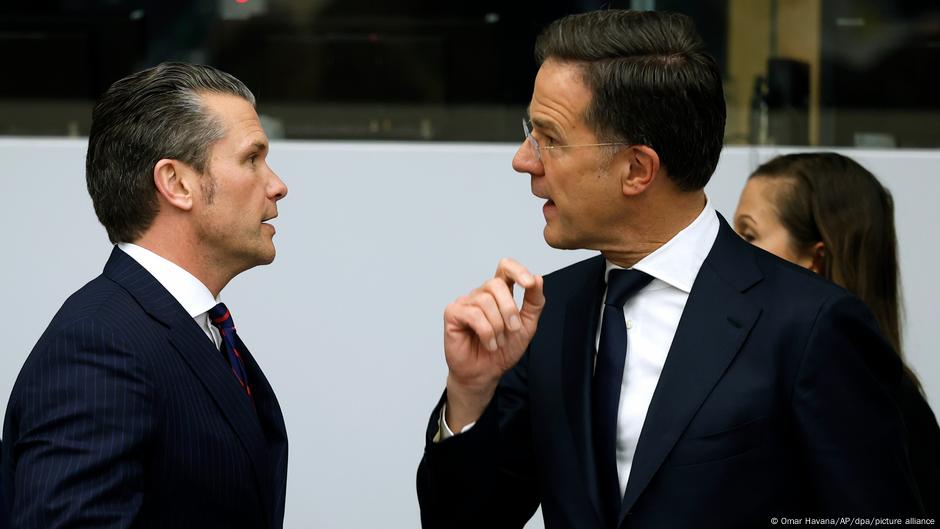
There’s no denying that the United States stands as the leading force within NATO, with its expansive military budget serving as a crucial pillar of European defense for many years. Recently, as representatives from the 32 NATO member countries arrived at the alliance headquarters amid a light Belgian rain, the announcement that Donald Trump had pledged to initiate peace discussions with Vladimir Putin regarding Ukraine only underscored Washington’s dominant role in these matters.
It seemed that the overcast skies weren’t the only challenge looming above them.
Reports indicate that Trump did not confer with or inform European allies prior to reaching out to Russian President Vladimir Putin. Some NATO officials appeared somewhat relieved that he subsequently contacted Ukrainian President Volodymyr Zelenskyy.
Preemptive concessions to Vladimir Putin?
Following suggestions from Washington that Ukraine may need to surrender land and reconsider its aspirations for NATO membership, the US faced accusations of making concessions to Moscow.
German Defense Minister Boris Pistorius stated to journalists in Brussels, “It would have been better to discuss Ukraine’s potential NATO membership or possible territorial losses at the negotiating table rather than removing these topics beforehand.”
The EU’s foreign affairs and security chief, Kaja Kallas, who participated in NATO discussions, shared similar concerns.
“Why are we conceding to [Russia] even before negotiations commence?” she commented to DW and other media on the sidelines of the talks. “This is appeasement, which has never yielded positive results.”
US Defense Secretary Pete Hegseth contended that the US is not betraying Ukraine. However, when questioned about potential concessions that Russia could face, he refrained from elaborating, stating, “The notion that engaging in discussions now equates to making concessions to Vladimir Putin is something I outright reject.”
“I challenge anyone to identify a world leader at this moment who, with credibility, can bring both leaders together for a lasting peace that benefits Ukraine,” he added.
Europe insists on a voice in the discussions
In light of Trump’s unilateral actions unsettling allies, many defense ministers convening at NATO expressed a clear demand: Europe and Ukraine must not be sidelined in future discussions.
“Any agreement made behind our backs will be ineffective. Any settlement must include both Ukraine and Europe,” Kallas asserted.
Additionally, some European nations seem eager to remind Washington thatprevious ceasefire agreements between Russia and Ukraine have not prevented Moscow from initiating a full-scale invasion in 2022.
“To effectively counter the threat of Russian aggression and establish peace, we must enhance our efforts,” asserted French Foreign Minister Jean-Noel Barrot through a message on X.
Limited influence over US policy?
Despite European countries increasing military expenditures, supplying weapons to Ukraine, and training its forces since 2022, they still depend heavily on US military support.
Burno Lete, a defense and transatlantic relations researcher at the College of Europe, explained that this diminishes Europe’s leverage in shaping US foreign policies.
“It appears that unity in the West began to unravel last night,” Lete observed, indicating a shift toward prioritizing US interests over collective transatlantic cooperation.
With Trump moving forward on the Ukraine issue independently of European consensus, not only is the cohesion of the West jeopardized, but European security is also compromised.
Ukraine’s most steadfast political and military allies are the Baltic states, which, due to their history within the Soviet bloc, are concerned that the Kremlin may target their borders next if a settlement favoring Moscow is reached regarding the Ukraine conflict.
Lithuanian Defense Minister Dovilė Sakaliene emphasized on Thursday that Europe must choose between “falling for the false belief that Mr. Trump and Mr. Putin will resolve everything for us — an ill-fated mindset — or Europe fostering its own economic, financial, and military capabilities.”
European involvement on the ground?
However, some argue that Europe still holds significant potential to exert influence moving forward. Camille Grand, a fellow at the European Council on Foreign Relations, emphasized that European nations possess “numerous tools” to navigate this situation.
“[European nations] provide the majority of financial support to Ukraine,” Grand pointed out, highlighting the country’s aspirations to join the European Union. “The reconstruction of Ukraine is likely to be predominantly financed by Europe,” he explained during the Munich Security Conference.
The US has ruled out deploying its own forces in any future peacekeeping operations in Ukraine, stating instead that “capable European and non-European forces” should be the primary supporters of future security arrangements.
Significantly, Hegseth clarified that any peacekeeping troops in Ukraine must not be associated with a NATO mission and thus would not be shielded by NATO’s Article 5 collective defense clause.
Camille Grand views this as an opportunity for Europe.
“The US expects Europe to offer security assurances in the form of European ‘boots on the ground.’ Addressing these crucial aspects is essential for an agreement that benefits both Ukraine and European security,” he stated.
“Europeans should clearly communicate their readiness to fulfill this role,” he concluded, emphasizing their desire to have a part in shaping an agreement that leads to a stable and enduring peace.
Edited by: Maren Sass









